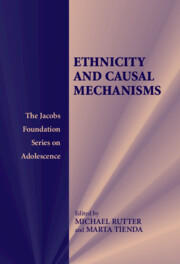Book contents
- Frontmatter
- Contents
- List of Contributors
- Foreword
- Preface
- 1 Natural Experiments, Causal Influences, and Policy Development
- 2 Growing Up Ethnic in the United Kingdom and the United States: Comparative Contexts for Youth Development
- 3 The Multiple Facets of Ethnicity
- 4 Educational Attainments: Ethnic Differences in the United Kingdom
- 5 Race and Ethnic Inequality in Educational Attainment in the United States
- 6 Racial and Ethnic Disparities in Crime and Delinquency in the United States
- 7 Explaining Ethnic Variations in Crime and Antisocial Behavior in the United Kingdom
- 8 Cultural Differences in the Effects of Physical Punishment
- 9 Ethnicity and Mental Health: The Example of Schizophrenia in the African-Caribbean Population in Europe
- 10 Ethnic Variations in Youth Suicide
- 11 Ethnicity and Intergenerational Identities and Adaptations in Britain: The Socio-Political Context
- 12 Assimilation, Dissimilation, and Ethnic Identities: The Experience of Children of Immigrants in the United States
- 13 Deciphering Ethnicity: Reflections on Research Opportunities
- Author Index
- Subject Index
13 - Deciphering Ethnicity: Reflections on Research Opportunities
Published online by Cambridge University Press: 05 July 2014
- Frontmatter
- Contents
- List of Contributors
- Foreword
- Preface
- 1 Natural Experiments, Causal Influences, and Policy Development
- 2 Growing Up Ethnic in the United Kingdom and the United States: Comparative Contexts for Youth Development
- 3 The Multiple Facets of Ethnicity
- 4 Educational Attainments: Ethnic Differences in the United Kingdom
- 5 Race and Ethnic Inequality in Educational Attainment in the United States
- 6 Racial and Ethnic Disparities in Crime and Delinquency in the United States
- 7 Explaining Ethnic Variations in Crime and Antisocial Behavior in the United Kingdom
- 8 Cultural Differences in the Effects of Physical Punishment
- 9 Ethnicity and Mental Health: The Example of Schizophrenia in the African-Caribbean Population in Europe
- 10 Ethnic Variations in Youth Suicide
- 11 Ethnicity and Intergenerational Identities and Adaptations in Britain: The Socio-Political Context
- 12 Assimilation, Dissimilation, and Ethnic Identities: The Experience of Children of Immigrants in the United States
- 13 Deciphering Ethnicity: Reflections on Research Opportunities
- Author Index
- Subject Index
Summary
Conceptualizing and empirically demonstrating how ethnic differences emerge, why they persist over time, and their consequences for youth development has proven to be a formidable research challenge. The highly fluid character of ethnicity coupled with temporal and spatial variation in its definition and measurement are two difficulties analysts must surmount, but inadequate conceptualization is perhaps the greatest hindrance to understanding how ethnic differences matter. Many analysts implicitly assume that ethnicity constitutes an explanation for variation in myriad psychosocial outcomes, rather than a phenomenon to be explained. This assumption hinders research into causal mechanisms. Whether by design or default, ethnic variation is often derived as a statistical residual rather than as a starting point for sharp theoretical questions about which of its multiple facets operates to produce the outcome of interest, what circumstances trigger ethnically differentiated responses, and which ethnic differences persist over time.
The chapters assembled in this volume illustrate the inherent difficulties not only of drawing causal inferences about how and why ethnic differences emerge, but also of generalizing about the circumstances through which ethnicity becomes a risk or protective factor for adolescents. In Chapter 3 we characterized ethnicity as a multifaceted phenomenon that is socially constructed and hence highly pliable. Subsequently, we identified possible mediators of ethnic effects, including individual and group identity, religion, language use, and myriad cultural practices that differentiate populations, irrespective of whether they send migrants elsewhere.
- Type
- Chapter
- Information
- Ethnicity and Causal Mechanisms , pp. 335 - 350Publisher: Cambridge University PressPrint publication year: 2005



